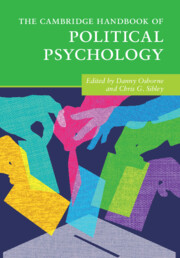Book contents
- The Cambridge Handbook of Political Psychology
- The Cambridge Handbook of Political Psychology
- Copyright page
- Dedication
- Contents
- Figures
- Tables
- Contributors
- Part I Foundations of Political Psychology
- Part II The Politics of Intergroup Attitudes
- Part III Contemporary Challenges to Democracy
- Part IV Diversifying Perspectives in Political Psychology
- 37 Political Psychology in the Global South
- 38 Political Psychology in the Arab Region
- 39 Critical Perspectives in Political Psychology
- 40 Rethinking Group Dynamics
- 41 Two Sides of the Same Coin
- Index
- References
37 - Political Psychology in the Global South
Collective Memory, Intergroup Relations, Ideology, and Political Participation
from Part IV - Diversifying Perspectives in Political Psychology
Published online by Cambridge University Press: 17 February 2022
- The Cambridge Handbook of Political Psychology
- The Cambridge Handbook of Political Psychology
- Copyright page
- Dedication
- Contents
- Figures
- Tables
- Contributors
- Part I Foundations of Political Psychology
- Part II The Politics of Intergroup Attitudes
- Part III Contemporary Challenges to Democracy
- Part IV Diversifying Perspectives in Political Psychology
- 37 Political Psychology in the Global South
- 38 Political Psychology in the Arab Region
- 39 Critical Perspectives in Political Psychology
- 40 Rethinking Group Dynamics
- 41 Two Sides of the Same Coin
- Index
- References
Summary
As in other areas of behavioural science, research in political psychology has focused on citizens of Western, Educated, Industrialised, Rich, and Democratic ('WEIRD') countries. In this chapter, we review recent studies of political psychology conducted in the Global South (e.g., Latin America, Africa, Middle East, and Asian/Pacific regions). Popular topics of inquiry in these regions include political participation, collective memory, intergroup relations, and ideology. There were also some context-specific themes, such as the role of political Islam in the Middle East. In reviewing the existing literature, we highlight patterns of convergence and divergence when it comes to conclusions about political psychology on the basis of research carried out in WEIRD and non-WEIRD countries.
Keywords
- Type
- Chapter
- Information
- The Cambridge Handbook of Political Psychology , pp. 601 - 623Publisher: Cambridge University PressPrint publication year: 2022
References
- 1
- Cited by

